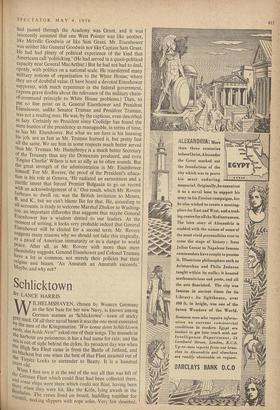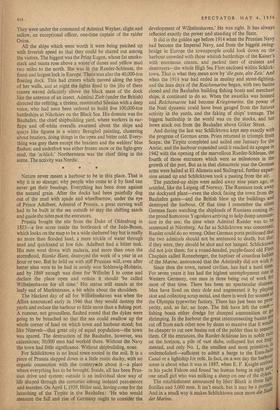Schlicktown
BY LANCE HARRIS WILHELMSHAVEN, chosen by Western Germany as the first base for her new Navy, is known among German seamen as `Schlicktown'—town of sticky grey mud. Of all their naval bases it was the one most execrated by the men of the Kriegsmarine. 'Wer kennt denn Schlicktown nicht, das holde Nest?' asked one of their songs. The mussels in the harbour are poisonous; it has a bad name for rain; and the sea is out of sight behind the dykes. Its proudest day was when the High Sea Fleet came in from the Battle of Jutland, and its blackest but one when the best of that Fleet steamed out of the Tirpitz Locks to surrender to Beatty. It is a hundred Years old. th When I first saw it at the end of the war all that was left of .ue German Fleet which could float had been collected there, (here some ships were there which could not float, having been „s",ere when they were hit, like the Köln, lying awash in the Illiatifieri. The crews lived on board, huddling together for j3Wda Uri . making slippers with rope soles. Very few deserted. They were under the command of Admiral Weyher, slight and sallow, an exceptional officer, one-time captain of the raider Orion.
All the ships which were worth it were being patched up with feverish speed so that they could be shared out among the victors. The biggest was the Prinz Eugen, whose fat smoke- stack and masts rose above a waste of dunes and yellow mud two miles to the north. She was in the Raeder-Schleuse, the finest and largest lock in Europe. There was also the 40,000-ton floating dock. This had cranes which moved along the tops of her walls, and at night the lights fixed to the jibs of these cranes waved delicately above the black mass of the dock like the antenna; of an insect. Admiral Zieb (under the British) directed the refitting, a tireless, resourceful Silesian with a deep voice, who had once been ordered to build five 100,000-ton battleships at Nikolaiev on the Black Sea. His domain was the Bauhafen, the chief shipbuilding yard, where workers in ear- flaps and off-white overalls swarmed about the ships and quays like figures in a wintry Breughel painting, clustering about braziers, doing things in the open and bitter cold. Every- thing was grey there except the braziers and the welders' blue flashes; and underfoot was either frozen snow or the light-grey mud, the 'schlick.' Northernness was the chief thing in the scene. The activity was Nordic.
* * Nature never meant a harbour to be in this place. That is why it is so strange; why people who come to it by land can never get their bearings. Everything has been done against the natural grain. After the docks had been painfully dug out of the mud with spade and wheelbarrow, under the eye of Prince Adalbert, Admiral of Prussia, a great curving wall had to be built in the sea outside to stay the shifting sands and guide the tides past the entrances.
Prussia bought the site from the Duke of Oldenburg in 18.53—a few acres inside the bottleneck of the Jade-Busen, which looks on the map to be a wide sheltered bay but is really no more than flooded land, a mere trickle of water through mud and quicksand at low tide. Adalbert had a bitter task. His men went down with malaria, and more than once the stormflood, Blanke Hans, destroyed the work of a year in an hour or two. But he held on with stiff Prussian will, even after better sites were to be had in newly won Schleswig-Holstein, and by 1869 enough was done for Wilhelm I to come and declare the place open and ordain it should 'be called Wilhelmshaven for all time.' His statue still stands at the leafy end of Marktstrasse, a bit white about the shoulders.
The blackest day of all for Wilhelmshaven was when the Allies announced early in 1946 that they would destroy the yards and reduce the harbour to little more than a fishing port. A rumour, not groundless, flashed round that the dykes were going to be breached so that the sea could swallow up the whole corner of land on which town and harbour stood; but like Nineveh—that great city of equal population—the town was spared. The destruction of the Bauhafen, however, was calamitous; 30,000 men had worked there. Without the Navy the town had little significance. Without shipbuilding, none.
For Schlicktown is no local town rooted in the soil. It is a piece of Prussia slapped down in a little rustic duchy, with no organic connection with the countryside about it—a place where everything has to be brought. Inside, all has been Prus- sian drive and system; outside is an individual slow way of life shaped through the centuries among isolated peat-moors and marshes. On April 1, 1939, Hitler said, having come for the launching of the Tirpitz in the Bauhafen 'He who would measure the fall and rise of Germany ought to consider the development of Wilhelmshaven.' He was right. It has always reflected exactly the power and standing of the State.
It did in the golden age before 1914 when the Prussian Navy had become the Imperial Navy, and from the biggest swing- bridge in Europe the townspeople could look down on the harbour crowded with those whitish battleships of the Kaiser's with enormous cranes, and packed tiers of cruisers and destroyers—the whole High Sea Fleet enclosed within Schlick- town. That is what they mean now by 'die gute, alte Zeit.' And when the 1914 war had ended in mutiny and street-fighting.
and the lean days of the Reichsmarine began, with two basins closed and the Bauhafen building fishing boats and merchant ships, it continued to do so. When the swastika was hoisted and Reichsmarine had become Kriegsmarine, the power of the Nazi dynamic could have been gauged' from the furious activity in the yards, and the faking of ships' tonnage. The biggest battleship in the world was on the stocks, and her bows stuck out from the Bauhafen above Goker Street.
And during the last war Schlicktown kept step exactly with the progress of German arms. Prien returned in triumph from Scapa; the Tirpitz completed and sailed one January for the Arctic; and the harbour expanded until it reached its apogee in 1942 with the opening of the marvellous Raeder-Schleuse, the fourth of those entrances which were as milestones in the growth of the port. But as in that climacteric year the German arms were halted at El Alamein and Stalingrad, further expan' sion seized up and Schlicktown took a pasting from the air. The patched-up ships were sailed away nine years ago, or scuttled, like the Leipzig off Norway. The Russians took awaY the dockyard plant—even the clock facing the town from the Bauhafen gates—and the British blew up the buildings and destroyed the harbour. Of that time I remember the silent German faces watching the shiploads of Russians coming in; the proud humorous Yugoslays arriving to help dump ammuni- tion in the sea; the time when Admiral Raeder was to be sentenced at Niirnberg. As far as Schlicktown was concerned. Raeder could do no wrong. Other German ports petitioned that the two admirals should not be sentenced to death, but that if they were, they should be shot and not hanged. Schlicktown did not join them; for a round-headed,' purple-faced old Fleet Chaplain called Ronneberger, the baptiser of countless babies i of the Marine, announced that the Admiralty did not wish it.
Since then the town, turned civilian, has had a hard time For seven years it has had the highest unemployment rate In Western Germany, one man in three being out of work fa most of that time. There has been no spectacular distress. Men have lived on their dole and augmented it by playing skat and collecting scrap metal, and there is work for women at the Olympia typewriter factory. There has just been no pros' perity, and, so far, no hope. The fish have left the coast-- fishing boats either dredge for dumped ammunition or g° shrimping. In the harbour the great interconnecting basins ar°, cut off from each other now by dams so massive that it would be cheaper to cut new basins out of the polder than to remel,° them. Of the entrances, the Raeder-Schleuse lies in noble raw on the horizon, a pile of vast slabs, collapsed but not frq: mented, and only No. 1, the smallest and most primitive. 1: undemolished—sufficient to admit a barge to the Erns-Jad! Canal or a lightship for refit. In fact, on a wet day the harboin scene is about what it was in 1887, when E. F. Knight arrived in his yacht Falcon and found 'no human being in sight sav.,0 one small girl who was milking a sheep on one of the dykes,:, The establishment announced by Herr Blank is three light flotillas and 5,000 men. It isn't much, but it may be a porta' And in a small way it makes Schlicktown once more die Sla der Marine.











































 Previous page
Previous page